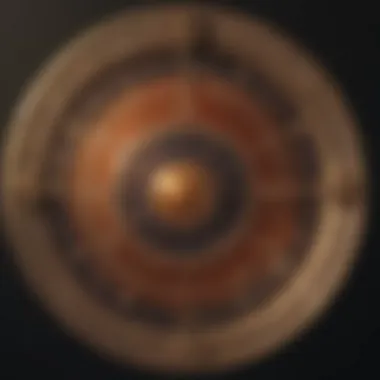Astrological Insights: When Will You Marry?


Intro
Astrology offers a unique perspective on personal relationships, particularly marriage. The belief that the alignment of celestial bodies at the time of birth influences our lives is pervasive. For those seeking answers about love and commitment, astrology provides more than mere speculation. It presents a framework of understanding complex dynamics. More specifically, examining the influences of the zodiac can enhance insights into potential timelines for marriage. In turn, this exploration can help individuals identify compatible partners and understand potential challenges.
Characteristics of Each Zodiac Sign
A delineation of the twelve zodiac signs helps provide clarity on personality traits. Each sign harbors unique attributes, strengths, and weaknesses that interact with others in significant ways.
Overview of Personality Traits
Understanding personality traits becomes essential when examining potential marital partners. Here’s a brief synopsis:
- Aries (March 21 - April 19): Impulsive and driven, Aries individuals can foster excitement in relationships but may exhibit impatience.
- Taurus (April 20 - May 20): Known for their practicality, Taureans often value stability, making them reliable partners.
- Gemini (May 21 - June 20): Adaptable and talkative, they are social beings but may struggle with emotional depth.
- Cancer (June 21 - July 22): Sensitive and nurturing, Cancer individuals prioritize emotional connections yet may be overly cautious.
- Leo (July 23 - August 22): Confident and charismatic, Leos can attract partners easily but may seek constant attention.
- Virgo (August 23 - September 22): Detail-oriented and analytical, they emphasize practicality and might overthink partnerships.
- Libra (September 23 - October 22): Diplomatic and fair-minded, they strive for balance but may avoid confrontation at times.
- Scorpio (October 23 - November 21): Passionate and mysterious, Scorpios offer intensity, which can sometimes lead to tumult.
- Sagittarius (November 22 - December 21): Free-spirited and adventurous, they may seek partners who share their zest for life.
- Capricorn (December 22 - January 19): Disciplined and ambitious, Capricorns may place career aspirations above relationships, leading to possible conflicts.
- Aquarius (January 20 - February 18): Innovative and altruistic, Aquarians cultivate unique partnerships but may be viewed as emotionally detached.
- Pisces (February 19 - March 20): Compassionate and imaginative, they possess a romantic idealism that could inspire relationships.
Strengths and Weaknesses
Identifying strengths and weaknesses in personality fosters empathetic awareness:
- Each sign's traits contribute significantly to marital dynamics—both positively and negatively.
- Acknowledging differences sets the stage for growth and improved interactions.
Compatibility with Other Signs
Compatibility is influenced not only by zodiac signs but by individual personalities as well. Certain combinations tend to create more natural unions:
- Aries and Leo: Both are fiery, leading to dynamic interactions.
- Taurus and Capricorn: Their Earth connections provide stability and shared values.
- Gemini and Libra: Air signs promote intellectual compatibility.
While these combinations may seem auspicious, it’s crucial to consider broader astrological elements, such as moon signs and rising signs, in any romantic assessment.
For more details on zodiac traits, consider looking into resources like Wikipedia or Britannica for deeper information and historical contexts.
In summary, understanding the complexities of each zodiac sign paves the way for a stronger grasp of marriage predictions in astrology. The inherent characteristics play pivotal roles in relationship formation and longevity.
Preamble to Astrology and Marriage
Astrology offers a framework for examining personal and interpersonal dynamics. It sheds light on how celestial movements may influence individual paths, particularly in the realm of marriage. In this article, we will delve into how horoscopes inform wedding predictions, revealing astrological insights regarding companionship and partnership.
Understanding the intricate links between astrology and marriage can illuminate various aspects of relationships. Currents flow differently based on zodiac signs. Accessible knowledge enhances not just personal insights but also interplays between lovers.
Understanding Astrology
Astrology is the study of celestial bodies' movements and their perceived influence on human affairs. At its core, it operates on the premise that the positions of planets at the time of one's birth shape personality and life trajectory. Each sign of the zodiac carries unique characteristics, strengths, and weaknesses, curated over centuries of observation and analysis. Thus, astrology becomes a tool for introspection and understanding, opening channels for personal growth. Understanding these factors is particularly advantageous even when contemplating significant life events like marriage.
Astrologers utilize birth charts to capture the celestial layout at specific moments, usually the time of birth. This chart serves as a guide. With it, practitioners can decipher fundamental layers of human experience. Zodiac sign placements inside houses dictate how energies translate into different life areas, affecting relationship choices or long-term commitments.
Marriage in Astrological Context
In astrology, marriage is more than just a union. It reflects deeper themes intertwined with personal growth and emotional bonding. In analyzing marriage through an astrological lens, one can observe how the complexities of planetary alignments manifest within romantic partnerships. Understanding the astrological context of marriage provides insights into compatibility, longevity, and shifts in emotional dynamics.
Furthermore, examining unique planetary placements reveals individual needs in a relationship context. Significant areas, like Venus and Mars positions in birth charts, influence attraction styles and partnership expectations.
“Marriage becomes a cosmic journey, governed by celestial movements and individual choices.”


Keeping this perspective, many turn hematite shortened marriage expectations alongside cosmic participation. Astrology blends intuition and chance, where efforts define fate in loving relationships. It stands not as an absolute dictatorship of destiny but as a mirror illustrating remarkable potentials when one reckons and talents meld inside the harmonies of love.'
The Role of Zodiac Signs in Marriage
In understanding the intersection between zodiac signs and marriage, it becomes apparent that astrological compatibility plays a significant role in romantic relationships. This aspect is crucial for anyone interested in diving into astrological correlations with matrilineal commitments. It highlights the mold that each zodiac sign brings into a partnership, intensifying the emotional and cognitive dynamics involved.
The analysis of zodiac signs offers insights into personalities, behaviors, and relationship tendencies. Each sign has unique strengths and weaknesses that contribute to compatibility. Understanding these traits not only identifies potential challenges but also reveals how couples harmonize.
Compatibility Among Zodiac Signs
Compatibility is more than just a notion; it is a foundation upon which successful marriages stand. Different zodiac signs exhibit diverse traits and values that may align harmoniously or clash strongly. Here are some key factors that illustrate compatibility:
- Elemental Affinities: Zodiac signs divide into four elements: Fire, Earth, Air, and Water. Fire signs like Aries, Leo, and Sagittarius thrive on passion. Earth signs such as Taurus, Virgo, and Capricorn favor stability. Air signs, including Gemini, Libra, and Aquarius prioritize connection through ideas. Water signs, including Cancer, Scorpio, and Pisces, navigate emotions deeply. Recognizing these elemental affinities can better guide relationship choices.
- Modal Qualities: Signs are also categorized by their modality: Cardinal, Fixed, and Mutable. Each modality embodies different approaches to relationships. Cardinal signs like Aries and Libra initiate relationships. Fixed signs, such as Taurus and Aquarius, focus on loyalty and steadiness. Mutable signs, including Gemini and Pisces, adapt easily to change. A thoughtful mix of these qualities paves the way for long-standing unions.
- Complementary Traits: Some signs resonate more effectively, creating a psychological balance. For instance, a venture-oriented Aries may find its counterpart in a patient Taurus. It is essential for partners to recognize their dynamic nature and how these traits play into their collective life.
Compatibility stems not just from analysis, but how individuals apply these insights! Partners engaging deeply with their astrological messages foster a more profound appreciation and access to each other's essence.
Zodiac Signs and Their Marriage Traits
It’s not just about who is compatible; it’s also essential to understand how different zodiac signs approach the institution of marriage itself. Marriage traits linked to individual signs offer foresight into what partners bring into the commitment. Here are a few signs and their common marriage traits:
- Aries: Bold and headstrong. They often initiate relationships but can be impulsive, making careful planning essential.
- Taurus: Reliable and grounded, they desire stability, which typically translates into faithful partners.For a Taurus, patience is an invaluable quality that supports long-term commitment.
- Gemini: Social and communicative yet often seek multiple forms of interaction. Ensuring their partner feels included in their world often leads to lasting connections.
- Cancer: Highly emotionally introspective, they bring deep empathy into relationships. They cherish emotional security and are known for nurturing their partners.
- Leo: Access to loyalty and warmth defines their approach. They value admiration and often respond positively to partners who appreciate their charisma.
- Virgo: Detail-oriented and practical, they prioritize planning and daily life organization, which supports stability in their partnerships.
These traits and tendencies reveal patterns that can align couples toward harmony or unsettle them into conflict. Navigating through these specific attributes illuminates pathways many couples take as they together explore their astrological compatibility.
Astrological Indicators of Marriage Timing
Astrological indicators play a vital role in predicing marriage timelines. Understanding these elements can provide insight into periods when commitment is more likely. This exploration stems from the belief that celestial events influence our lives in various areas, including relationships. As individuals look to the stars for guuidance, astrology also offers comfort and clarity around such personal journeys.
Birth Chart Analysis
A detailed birth chart analysis is paramount for grasping one's potential marriage timeline. Each birth chart is as unique as the individual himself. It encompasses the positions of planets at the moment of a person's birth and how they interact with one another over time. Among these planets, Venus and Mars present significant indicapers of relationship dynamics. Furthermore, the Moon's place may hint at emotional needs within a marriage.
A birth chart handles many layers. For those interested in whether marriage is likely, an astrologer can identify key transits concerning a naval time dial and how marriage commitments might manifest.
Significant Planetary Transits
Planetary transits are moyements of planets that can trigger important life events yet detemain their overall impact on marriage varies. Saturn is historically viewed as the taskmaster planet. Its return every 29 years signals reflection in commitment and responsibility. When Saturn transits through the 7th house of partnerships, it foreshadows growth and grounding within relationships.
Major planetary transits, such as Jupiter and Venus, also underscore this marrequ congregative period.
- Jupiter transits can spur optimism and abundance, potentially presenting favorable dating opportunities.
- Venus transits predict heightened romantic interest, creating a conducive atmosphere for committing.
Astrologers may use these patterns to analyze periods that foster harmonious relationships.
The Role of the Fifth and Seventh Houses
Exploring marriage timing without mentioning the Fifth and Seventh Houses is inadequate. The Fifth House governs romance, creativity, and pleasure. It's the space where lighthearted interactions flourish. Over time, planets transiting this house signal playful exploration, paving the path to deeper connections. This is yrucially relevant for people arriving at significant moments in their love life.
On the contrary, the Seventh House revolves around defined partnerships and commitments. It carries the ties of marriage as well as long-term relationships. When this house is under special influences, such as significant transits, the chances of marriage may increase accordingly. Both BUthouses flavors one's experience of love nnd commitment.
Astrological Tools for Marriage Predictions


Astrological tools can provide keen insights into the timing and nature of marriage. These tools are essential for anyone wanting to understand or predict their matrimonial journey through the lens of astrology. They offer practical applications and guidelines by analyzing celestial influences that may shape romantic relationships and their outcomes. In this section, we explore synastry and composite charts, shedding light on each's significance in marriage predictions.
The importance of these astrological aspects lies in their ability to give clarity and direction in personal lives. Many people seek to understand themselves and their partners better, and utilizing astrological tools promotes deeper reflection. When applied correctly, these methods serve not only as navigational aids but also offer clues to resolved conflicts and compatibility.
Synastry: Comparing Two Birth Charts
Synastry involves examining two individuals' birth charts to assess their compatibility. By overlaying the charts, astrologers can determine how the planets position relative to one another creates dynamic interactions. This art can reveal how one person’s planetary placements impact the other.
Some key aspects that arise in synastry include:
- Aspects: These are angles made between the planets in the charts. Strong aspects often suggest potential attractions or tensions.
- Venus and Mars placements: These planets traditionally represent love and passion, influencing attraction and intimacy in relationships.
- Harmonious or challenging configurations: For example, if one partner’s Saturn trines their partner’s Venus, it indicates stability and respect. In contrast, a square might suggest friction and the necessity for adjustments.
Synastry not only serves to analyze romantic potential but also explores the balance of strengths and weaknesses within the relationship dynamic.
Composite Charts: Understanding Relationship Dynamics
Another powerful tool in relational astrology is the composite chart. Unlike synastry, which compares two individual charts, a composite chart creates a singular chart representing the relationship itself by averaging the geometrical positions of the planets between the two birth charts.
Composite charts are especially insightful as they showcase:
- Shared goals and ambitions: The composite sun can hint at the central purpose or intent of the relationship.
- Challenges: The placements of the planets in a composite chart can reveal potential difficulties the couple might face, actionable insights to deepen mutual understanding.
- Intellectual connection: The composite Mercury can reflect how well-connected two people are when it comes to communication and thought processes.
By analyzing the composite chart, one can gauge how both individuals blend energies in a partnership, unveiling both highlights and possible areas needing work.
Understanding synastry and composite charts amplifies the tools available to those examining astrology. They unlock the layers beneath the surface, offering pointed insights into marital potential.
These tools ultimately illuminate personal relationships through the cosmic movements, enabling individuals to form better connections based on genuine understanding and empathy.
Astrology and Free Will
Astrology intertwines deeply with the concepts of fate and individual agency in matters of love and marriage. Understanding the delicate balance between astrological influences and personal choices is crucial for anyone exploring marriage through an astrological lens. Practitioners and enthusiasts alike must recognize that astrology is not a mere formula dictating life outcomes. Instead, it serves as a tool to enhance our discernment and illuminate paths we may take.
Astrological insights provide clarity on periods favorable for partnership, personality compatibility, and the ideal environment for lasting love. Yet, the degree to which these celestial markers impact our outcomes varies significantly among individuals. For instance, someone with strong Leo traits may be inclined to seek admiration in romantic relationships. However, the choices they make—whether to express these traits positively or negatively—play a decisive role in the evolution of that relationship.
While astrology can forecast potential challenges or harmonious phases, it still leaves room for free will. Therefore, understanding this relationship can significantly alter perceptions about love and future commitments.
The Influence of Choices on Destiny
Choices infuse life with meaning and delineate personal paths. In the realm of astrology, the alignments and planetary positions at the time of one’s birth lay the groundwork for characteristics and inclinations. Yet, proximity to guests or friends additionally brackets a unique narrative. This perspective posits that though certain personality traits and external influences affect us, the fundamental decisions we make still guide individual destinies.
- Making Proactive Choices: A person may recognize a tendency towards impulsive behaviors detailed within their birth chart. Instead of succumbing to drives that lead to tumultuous relationships, they can prioritize reflection and mindfulness in their connections.
- Applying Astrological Insights Wisely: Engaging with learned forms of astrology creates new ways of thinking. Recognizing significant planetary transits, for instance, allows couples to fortify or resolve issues with intention rather than in haste.
- Balancing External Influences with PersonalAgency: Even anticipated predilections in relationship matters must be viewed through the lens of personal accountability. Each decision, however slight, accumulates and creates a cumulative impact on relational pathways.
Thus, it becomes clear: choices do weigh even in an astrological framework. Individual agency turns the seemingly deterministic surges of life into woven tapestries reflecting human experiences.
Astrological Predictability vs.
Individual Agency
The debate between astrological predictability and individual agency has intrigued many over generations. On one side lie the structured aspects of astrology, portraying clear avenues and trajectories. Here, the significance of fixed signs and planets is decidedly deterministic. For example, Saturn’s position at a person’s birth may signal challenges punctual to responsibilities—quickly presenting life’s lessons via personal frameworks.
On the other side resides the authenticity of human expression, self-awareness, and resilience amidst life's unpredictability. While predictions indicate patterns, human responses carry an equal weight in steering destinies. Through self-awareness, individuals can reshape energies referenced in charts and contact their deeply held motives.


"Astrology is a way to diagnose potential but never a recipe with an inflexible outcome."
- Observing Patterns for Growth: Many may seek validation through astrology’s predictability to gain insights into potential outcomes in love. It can be instrumental for developing oneself while also ensuring future alignment within relationships. The overlap between nodal points and self-strived goals marks these applicable forms of astrology.
- Empowering Couples to Co-Create: Astrological readings assist partners in establishing a cooperative effort. While certain timing aids readiness for mutal ventures like marriage, individual choices and joint decisions cultivate fuller harmonies. Understanding both personal roles and relational dynamics encourages consummate participation in fate’s casting.
- Navigating Ambiguities: Logical leaps can periodically harbor self-defeating feelings of helplessness. Nonetheless, awareness about commingling astrology with free will mitigates such distress, reinforcing sentiments or prophecies construed mulitidirectionally.
Along these lines, both concepts—astrological predictability and individual agency—should be perceived as complementary rather than competing truths. Recognizing one’s free will coupled with surrogate cosmic pathways constitutes the coherence of marital pursuits.
Common Misconceptions About Astrology and Marriage
Understanding astrology's profound impact on marrying paths entails dissecting frequent misconceptions associated with it. This article emphasizes the significance of unraveling these myths to cultivate clarity around astrology's potential in guiding individuals toward marriage. Recognizing these misunderstandings can empower readers to utilize astrological insights effectively in their journey toward romantic commitments.
Astrology as Deterministic
A prevalent misconception is that astrology prescribes a predestined path. Many people presume that astrological forecasts fix life's course, where one individual's fate is locked into positions of celestial bodies.
It is essential to understand that astrology does not equipment rigidity in life choices. Significantly, astrology will highlight trends or tendencies influenced by astrological elements. Individuals often overly rely on their chart without questioning the importance of personal choices.
Astrological predictions often address possibilities rather than certainties. The insight found in date of birth and planetary alignments can suggest favorable times for connections but lacks determinism. Adapting to circumstances is equally invalidated when individuals press upon astrological forecast as being of course.
Another element warrants awareness: being born under a particular sign does not limit one's scope of personality or potentiality in life. Geminis, for instance, are not bound to be two-faced defenders only. They have depths beyond typical traits prescribed by their star sign. Thus, intertwining astrology with deterministic beliefs creates a misleading narrative.
Skepticism Surrounding Astrological Claims
Skepticism remains a looming force over esoteric domains like astrology. This worldview often leads individuals to brush aside perhaps valuable tools for introspection and guidance in love and partnership.
Doubts can stem from metaphysical roots, often deemed invalid since not purely founded on scientific validation. Consequently, this skepticism raises questions as to the reliability of astrological predictions when concerning marriage. Claims through science govern elucidated patterns derived merely from evidence based on matrices in nature. However, astrology is largely philosophical, driving focus towards interpretation rather than quantifiable results, leading to friction against logically standardized thought patterns.
Beyond this foundational skepticism lies supplements variations in astological methodology pursued across various traditions. Consider methodologies a branch of what scientific scepticism terms “pseudoscience” limit these practices to underwhelming perspectives. Further investigations unveil fruitful frameworks for personal growth and awareness fostered by astrological insights, which reliability skeptics could rediscover with careful analysis and critical thought.
“Skepticism in astrology often overlooks its potential as a tool for self-reflection and growth.”
By rebuffing allegations surrounding the burden of being cast into all or nothing paradigms, it becomes prudent to discern the intricate parameters astrology entails. Understanding astrology’s position not as a strict set of consequences but as guides reflecting habits complemented by attending considerations, renders a more fruitful exploration of both semi-perceptions and real-life application.
Ending: Integrating Astrology into Personal Life
Astrology offers profound insights into various life domains, including marriage. In this article, we have discussed the factors that affect marriage timing and compatibility through astrological lenses. By understanding how astrology influences personal relationships, individuals can apply this knowledge to make more informed life choices. Integration of astrological insights into personal life leads to greater self-awareness.
“Astrology serves not only as a reflection of the cosmos but also as a mirror of the self.”
When thinking about marriage, recognizing astrological cues can prompt individuals to reflect on their own desires, both in partnerships and in matters of commitment. Here are the vital aspects:
- Benefits of integrating astrological insights enrich personal understanding.
- A deeper comprehension of one’s natal chart also promotes enhanced self-awareness and reflection about emotional responsiveness.
- Understanding the dynamism between planetary movements can help to facilitate better relationship goals.
Going beyond mere curiosity, astrological integration encourages individuals to establish more conscious relationships. It can guide one toward a considerate approach when contemplating compatibility and potential marriage partners.
Practical Applications of Astrological Insights
Understanding practical applications of astrology allows for an active approach to using these cosmic tools in romantic contexts. By applying concepts such as birth chart interpretation, potential couples can review compatibility early in a relationship. The practical tools include:
- Both natal and synastry charts: Evaluate how individual energies interact.
- Timing techniques: Utilize forecasting methods to pinpoint instants of opportunity for relationship progression, such as seventh house transits.
- Personal reflections about whether one's desires are harmonized with astrological prediction trends.
Practically, astrology may influence decisions like when to engage in significant discussions about marriage or visualize auspicious moments for a proposal. This careful planning fosters an environment conducive to mutual growth and understanding.
Encouragement for Self-Reflection Through Astrology
Astrology extends an invitation to self-reflect, prompting questions about one's values and aspirations in relation to marriage. Engaging with astrological insights draws attention to:
- Self-awareness: Taking stock of personal tendencies helps illuminate what emotional attributes one brings into a relationship.
- Value examination: By recognizing useful astrological markers, individuals can assess what kind of partnership they truly desire.
- Cyclical patterns: Identifying entry points and recurring themes in the natal chart points toward areas of growth and potential relationships.
Encouraging self-reflection through astrology inspires a more profound exploration of romantic engagements. Rather than solely relying on future predictions, this approach fosters understanding of one's intrinsic motivations linked to marrying.







